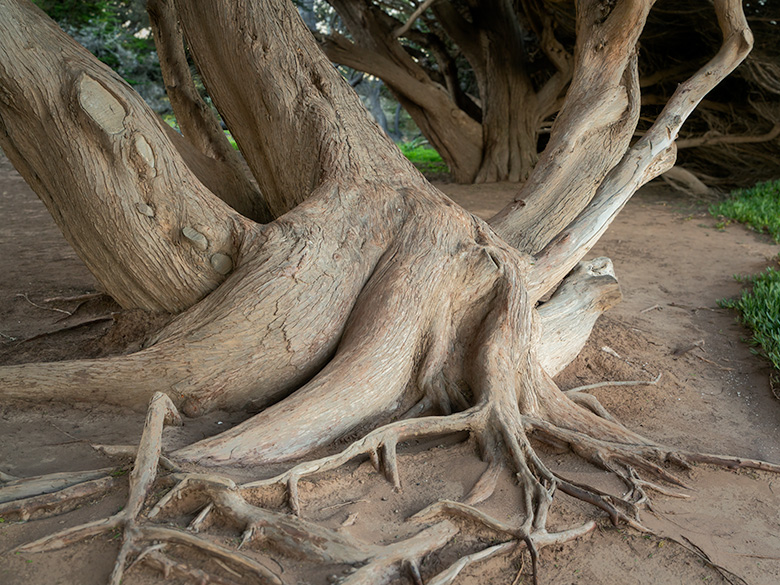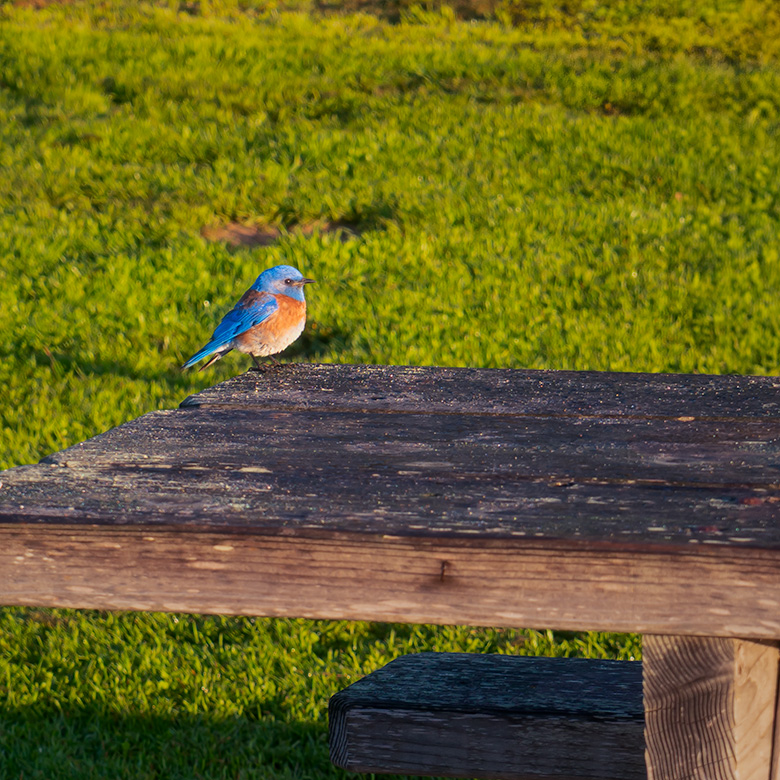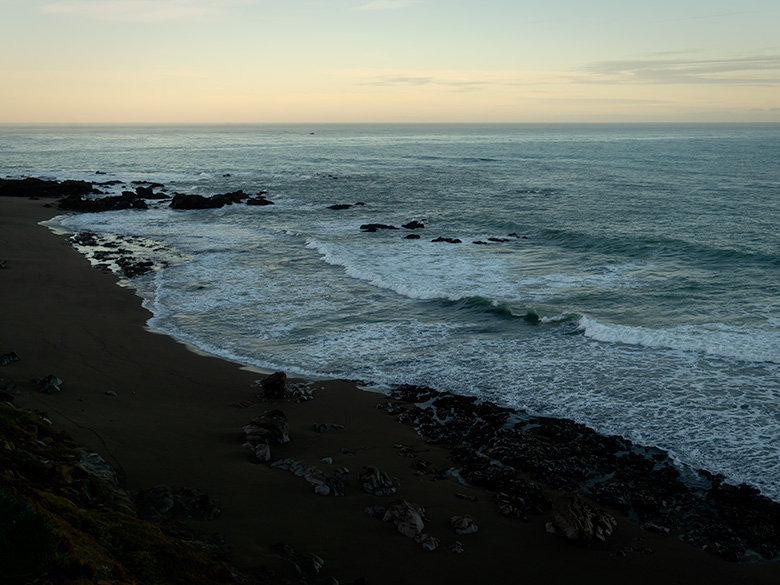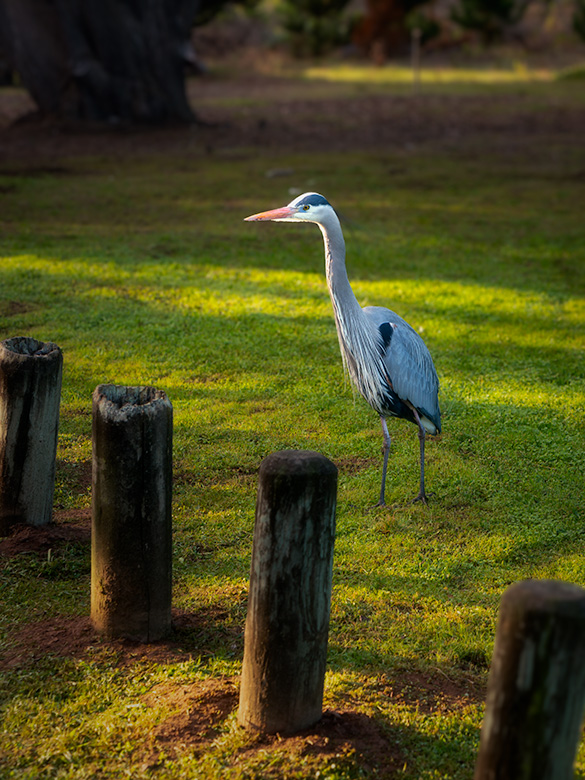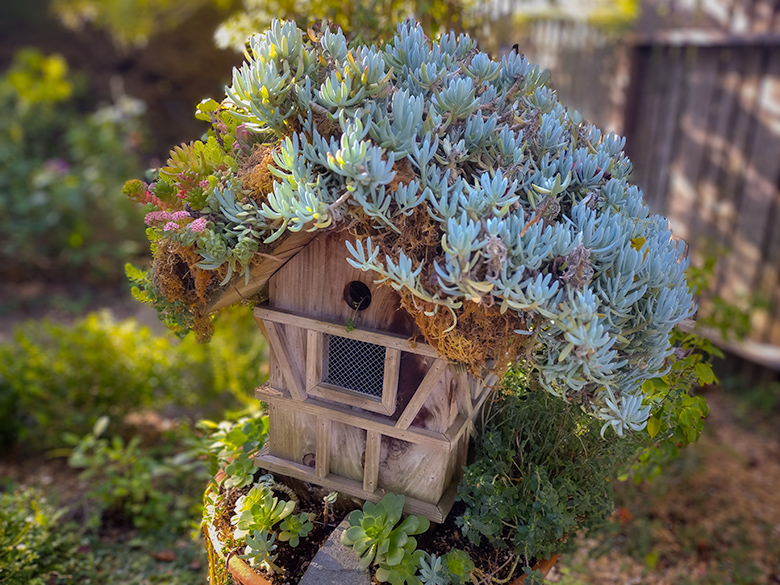
There’s a window between breakfast and when Queen Anne finishes her transformation sequence. If I don’t use it, I’m trapped in a room full of mirrors, hair product, and decisions about whether navy is “too predictable.”
So I wandered outside—not far, just down the gravel path that winds behind the main building of the Cambria Pines Lodge. The lodge, if you’ve never been, looks like the kind of place where weddings happen at sunset and someone’s cousin eventually ends up in the koi pond. It’s quaint. Rustic. The walls creak in the wind. The wifi creaks all the time.
But the gardens — those are something else.
Most hotels put in landscaping as an afterthought. A few hedges, a lawn, maybe a dying lavender bush in a whiskey barrel. Not here. The gardens came first. Literally, in 1929, a nursery tycoon named Mr. Covell laid out the grounds not to accent a hotel — but to show off his rare plants. The lodge came later, almost as an apology. “Come see my lobelias,” he might’ve said, “and if you get tired, we have rooms.”
Covell was big on juxtaposition. Cactus next to roses. Pines next to palms. I suspect he was the kind of man who called eucalyptus a conversation piece. The grounds still host garden shows and landscaping workshops, and judging by the succulents, he may have been on speaking terms with his next-door neighbor, Randolph Hearst.
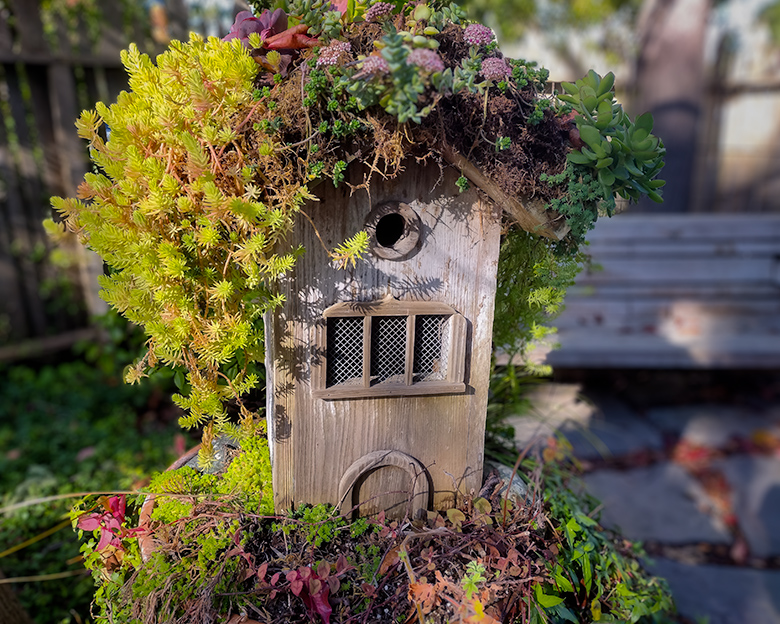
That’s Just the Cover Story
Tucked into one of the garden’s shady corners, I found a row of ornate birdhouses, each one weathered and half-swallowed by clusters of succulents. They leaned at odd angles, rooflines buried beneath rosettes of jade and lavender-toned sedum.
“What a clever idea for a planter,” I mumbled aloud.
“That’s just the cover story,” came a familiar gravelly voice — the kind that carried faint traces of the East River, like someone who once tried not to have an accent but never quite pulled it off.
I turned, expecting another guest or maybe a gardener. Instead, I was greeted by a raccoon. An aging one. Standing upright. One arm was draped casually across the arm of a wooden bench. The other? Holding what looked very much like a scale-model Havana cigar.
He gave me a long, squinty look that somehow sparkled while also suggesting he’d already solved three mysteries today. The black patches around his eyes looked like wire-rimmed glasses, and streaks of gray crept along his muzzle like sideburns that had given up.
He was leaning on one of those California garden benches with a name plaque bolted to the backrest. I didn’t look just then; it didn’t seem important at the time.
I blinked. Then, brilliantly: “You’re… a talking raccoon.”
He dragged on the cigar, exhaled nothing, and said,
“We talk all the time. Your kind just never listens.”
Still stunned, I tried to recover.
“Do you talk to all the hotel guests?”
He smirked.
“Mostly, we stay away. But you’re different. You’re weird. And your wife wears a plastic tiara to breakfast, so you’re probably somebody.” The name’s Rocky,” he said, puffing on the cigar that didn’t burn. “But around here my folk call me George… for some reason.”
I nodded like that explained something.
“Hi, I’m Jim. What do you mean the planters are a cover story? A cover story for what, exactly?”
George squinted at me with something between pity and amusement.
“For the truth,” he said. “And believe me—you don’t want to know how deep the mulch goes.”
“Try me,” I shot back.
George twirled his twig-sized cigar in the air like a conductor about to cue the string section.
“Don’t you notice anything missing?”
I glanced around, hoping something obvious would jump out. But the garden looked perfectly normal. Impossibly curated, even.
“No,” I said. “Things look… perfect.”
“That’s because you’re looking with your eyes and not your ears,” George said, already disappointed.
“Don’t you notice how strangely quiet it is?”
“Yeah. I like that.”
He sighed through his nose, as if I’d just missed the whole point of the universe.
“No, Curly — don’t you notice there’s no songbirds?
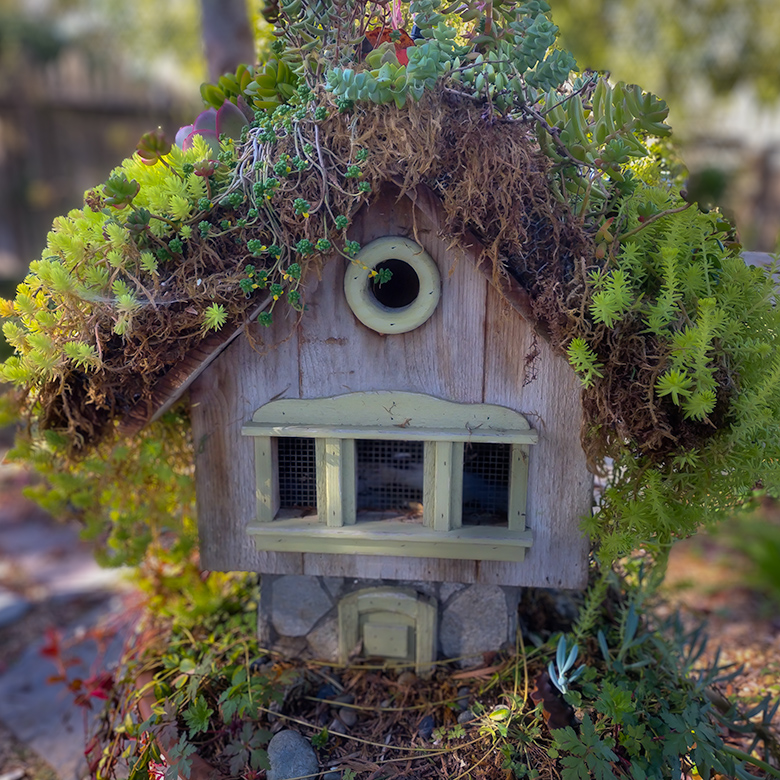
When the Garden Was Loud
George adjusted his posture like he was settling in for a fireside story, minus the fire.
“Before the silence, we had sparrows. Bluebirds. Thrushes. Finches, even. We were lousy with melody back then. Whole mornings would pass in song battles. Territory disputes settled with harmony instead of feathers.”
“That house over there?” he said, pointing at the fanciest birdhouse in the shade. “Used to be the zoning office. Mostly disputes about nest overhangs and who was allowed to hang wind chimes. The wrens ran it — fair but strict.”
I blinked. “You’re saying… the birds had a council?”
“A council, a housing board, three choirs, and an amateur seed-throwing league,” George said flatly. “It wasn’t perfect. But it was alive.”George paused, reached up with his free paw, and pushed at the fur around his eye like he was adjusting a pair of nonexistent glasses — the kind he probably wore in a past life. The gesture landed like a punctuation mark.
“Then the humans stopped tending the feeders. The suet dried up. The fountains got slimy. The bluebirds were the first to leave. Then the thrushes. The rest followed.”
He paused.
“The pigeons?” I asked, curious.
George shook his head. “Pigeons are just sparrows with gambling problems. They moved to Pacoima. Haven’t been back since the peanut debt scandal.”
I didn’t know what to say to that, so I didn’t.
“That was the mayor’s house,” George said. “She ran three feeder disputes and one mating scandal out of there. “
‘Sup George
We were just starting to hit a rhythm — George waxing poetic about bird bureaucracy, me barely keeping up — when a voice drifted in from our right.
“‘ Sup, George.”
It came from a small coastal mule deer standing half in the shade of a low juniper. I say “standing,” but he was slouched. Hard to tell if he had antlers — his hoodie was pulled so low it covered his eyes, and the sleeves hung well past his knees.
“Hey, Daryll,” George replied, barely turning his head.
Then, leaning toward me, he added in a hushed voice,
“He thinks he’s a celeb ’cause one of his kin starred in a movie a long time ago. They still run it on PBS during pledge week. It’s too violent for me. They shoot the mother.”
“Why’s he dressed like a punk?” I asked. “He does know he can’t run with his pants that low, right?”
George didn’t answer. Just stared after him with the quiet sadness of someone who’s already tried. George shrugged.
“Had a vape habit. Rehabbed in Morro Bay. These days, he mostly plays Candy Crush on his phone and wanders the neighborhood with his pants halfway down his backside. Says it’s a ‘statement.’ I think it’s just bad elastic.”
Daryll didn’t say anything else. He just nodded toward us like he might return later, then vanished behind a hedge, earbuds in, and his tail barely twitching.
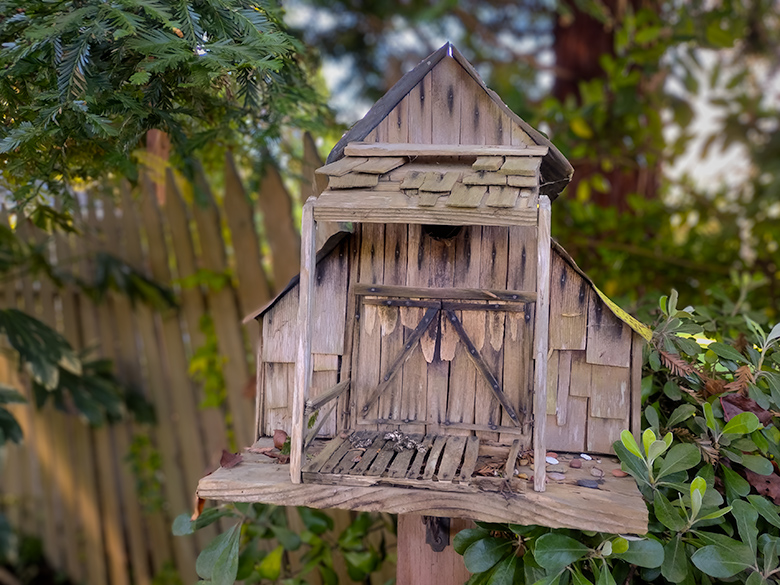
The Scout and the Succulents
George’s voice dropped lower as we walked, like he didn’t want the garden itself to hear.
“It’s not about shelter,” he said. “We’ve got roofs. Shade. Free mulch. But they didn’t leave because of housing. They left because the world got… wrong.”
“Wrong how?”
“Thin, he said. “The sky tasted funny. You know how the air gets before a storm? It felt like that, but all the time. The bluebirds left first. Then the wrens. Even the finches packed it in.”
He paused near the second birdhouse — the tall, elegant one, its wooden walls still proud beneath a crown of trailing succulents.
“Funny you say that,” I offered. “I saw a bluebird this morning. Took a photo of it at the park across the highway.”
George stopped walking. Didn’t blink.
“You’re lucky,” he said slowly. “That was Indigo Jack.”
He stepped closer to the birdhouse, touching the platform’s edge like he remembered something private.
“That’s where Jack stops when he comes. He doesn’t stay long. Never sings. That’s how we know it’s him.”
Like that Potter kid, I didn’t want to interrupt while Gandalf talked. Not that George had a staff — just a twig that smelled like burnt mulch.
“Jack’s a scout,” George continued. “He flies ahead of the flock. Checks the air, the ground, the trees. Looks for signals. We don’t know what kind. Something in the dirt, maybe. A rhythm. A scent. A change in temperature. Nobody asks. He wouldn’t tell us anyway.”
He puffed on his cigar for effect, then glanced at me sideways.
“He used to be bright blue. Almost electric. These days, he’s gone a little gray.”
We passed the third birdhouse — the round, bushy one with a dense succulent crown, like a thatched roof overtaken by leafy tentacles.
George pointed at it.
“We think the succulents are listening.”
“Come on.”
He gave me that sideways look again, like I’d just insulted his mother’s potato salad.
“If you ever turn your back on one, they wiggle their stubby arms, doing that thing where they stick their fingers in their ears and blow raspberries.”
I blinked. “How do you know they move?”
“Because we have to send a cleaning crew out every morning to pick up the beer cans after their frat parties.”
Then he looked over his shoulder, lowering his voice:
“There was another scout once. Before Jack. Showed up unannounced. Landed on the gazebo rail like he owned the place.”
“What happened to him?”
“Didn’t stick the landing.”
Not a Song. Not Yet.
The next morning, the garden was still. Not dead — just… held in place. Like the whole place had paused to hear something faint.
I wandered the paths again, slower this time. George was nowhere to be seen. Neither was Daryll. Not even a hummingbird dive-bombed the feeders. Then I heard it — not a song, not even a chirp. Just the soft beat of wings cutting the air. I looked up.
At the far end of the garden, on the oldest birdhouse — a barn-shaped thing collapsing under its memories — a bird had landed. Smaller than Jack. Grayer. Still. She didn’t sing. She didn’t move.
“That’s not Jack,” I whispered.
George appeared beside me like he’d been there all along. He stared at the birdhouse for a long time before speaking.
“She’s one of the listeners,” he said. “They come first. If she sings, it’s too soon.”
He glanced at me, eyes squinting with that familiar gleam.
“If she comes back with company…”
He let the sentence hang.
“… that’s when you’ll know.”
Just then, the unmistakable clank of a garbage can lid echoed faintly through the trees — hollow and metallic, like someone had just uncovered a half-eaten burrito from last night’s wedding reception.
George didn’t flinch.
“Listen, kid,” he said, already turning away. “I’d love to spend the rest of the day talking with you, but that’s my lunch bell.”
He wandered down a rosemary-lined path, disappearing into the green, pausing momentarily to snap off a twig for seasoning.
I stayed in the garden a little longer. Walked the loops again. Let the silence settle. Then I returned to that bench — the one George had leaned on when we first met. The wood was cool. The seat creaked just slightly when I exhaled. I didn’t check my phone.
I didn’t try to understand any of it.
Eventually, I stood and set off to find Queen Anne and start the day’s drive. That’s when I noticed it — the plaque: tarnished brass, just two words.
Goodnight Gracie.
I left the garden changed. Not in a dramatic way — no epiphanies, no flash of purpose. Just a quiet feeling, like someone had handed me a secret I didn’t quite understand yet.
Queen Anne was waiting by the car, looking regal and impatient in her travel tiara, blissfully unaware of the diplomatic tension I’d just witnessed among the local fauna.
As I turned to go, something caught my ear — soft, tentative.
A chirp.
Not a song.
Not yet.
But close.
Thanks for listening with your eyes.
jw
BTW:
Last year, Wickenburg got a stand-alone butcher shop: Capitol Meats. It sells all-natural, hormone-free, grass-fed beef. It’s not cheap, but we saw a line out the door for their hamburgers last Saturday, so we got in.
The line moved fast: one woman on the register, four guys on the flattop. We split a $15 burger and waited. While I wandered the shelves, I had a full-on epiphany: nothing was packaged in plastic or aluminum. There was nothing to recycle—just honest food in glass and paper. I caved and bought two small jars of truffle-infused mayo. Who needs a pig anymore?
When the burger arrived and we took our first bite, we moaned in stereo. The forward flavor? Beef. Real beef. Everything else was backup singers.
If your favorite burger joint wins you over with secret sauce, you don’t know what you’re missing.
Highly recommended. Just… don’t crowd it up.

